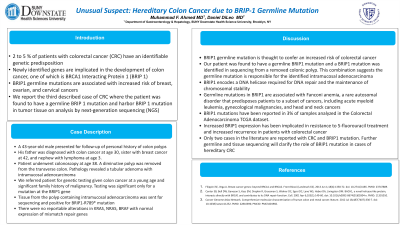Monday Poster Session
Category: Colon
P1637 - Unusual Suspect: Hereditary Colon Cancer Due to BRIP-1 Germline Mutation
Monday, October 23, 2023
10:30 AM - 4:15 PM PT
Location: Exhibit Hall

Has Audio
.jpg)
Muhammad F. Ahmed, MD
SUNY Downstate Medical Center
Brooklyn, NY
Presenting Author(s)
Muhammad F. Ahmed, MD1, Daniel Dileo, MD2
1SUNY Downstate Medical Center, Brooklyn, NY; 2Brooklyn VA Medical Center, Brooklyn, NY
Introduction: Colorectal cancer (CRC) arises in 2 to 5 % of patients with an inherited syndrome. Several genes have been newly implicated in CRC including BRIP 1. Germline mutations in BRIP1 increase the risk of breast, ovarian, and cervical cancers. We report a case of CRC in which the patient was found to have a germline mutation and harbor the BRIP1 mutation in tumor tissue on genomic sequencing.
Case Description/Methods: A 43-year-old male presented to our office for follow up of personal history of colon polyps. Patient denied any complaints .His father was diagnosed with colon cancer at age 30, sister with breast cancer at 42, and nephew had lymphoma at age 3. His vital signs were within normal limits and physical examination was unremarkable. Laboratory tests were also unremarkable.Patient underwent colonoscopy at age 38, at which time a diminutive polyp was removed from the transverse colon. Pathology revealed a tubular adenoma with intramucosal adenocarcinoma. Patient next underwent colonoscopy at age 40, where a 3 mm tubular adenoma was removed from the sigmoid colon. We referred the patient for genetic testing given colon cancer at a young age and significant family history of malignancy. Testing was significant only for a mutation at the BRIP1 gene. Tissue from the polyp containing intramucosal adenocarcinoma removed at age 38 was sent for next generation sequencing which was positive for BRIP1-R789* mutation. There were no reportable alterations in KRAS, NRAS, BRAF with normal expression of mismatch repair genes.
Discussion: BRIP1 mutation is thought to confer an increased risk of colorectal cancer. Our patient was found to have a germline BRIP1 mutation and a BRIP1 mutation identified in sequencing from a removed colonic polyp suggesting his germline mutation is responsible for the identified intramucosal adenocarcinoma. BRIP1 encodes a DNA helicase required for DNA repair and the maintenance of chromosomal stability. Germline BRIP1 mutations are associated with Fanconi anemia, myelodysplastic syndromes, gynecological malignancies, and head and neck tumors. BRIP1 mutations have been reported in 3% of samples analyzed in the Colorectal Adenocarcinoma TCGA dataset. Increased BRIP1 expression is implicated in resistance to chemotherapy and increased rates of colorectal cancer recurrence. Only two cases in the literature are reported with CRC and BRIP1 mutation. Further germline and tissue sequencing will clarify the role of BRIP1 mutation in cases of hereditary CRC.
Disclosures:
Muhammad F. Ahmed, MD1, Daniel Dileo, MD2. P1637 - Unusual Suspect: Hereditary Colon Cancer Due to BRIP-1 Germline Mutation, ACG 2023 Annual Scientific Meeting Abstracts. Vancouver, BC, Canada: American College of Gastroenterology.
1SUNY Downstate Medical Center, Brooklyn, NY; 2Brooklyn VA Medical Center, Brooklyn, NY
Introduction: Colorectal cancer (CRC) arises in 2 to 5 % of patients with an inherited syndrome. Several genes have been newly implicated in CRC including BRIP 1. Germline mutations in BRIP1 increase the risk of breast, ovarian, and cervical cancers. We report a case of CRC in which the patient was found to have a germline mutation and harbor the BRIP1 mutation in tumor tissue on genomic sequencing.
Case Description/Methods: A 43-year-old male presented to our office for follow up of personal history of colon polyps. Patient denied any complaints .His father was diagnosed with colon cancer at age 30, sister with breast cancer at 42, and nephew had lymphoma at age 3. His vital signs were within normal limits and physical examination was unremarkable. Laboratory tests were also unremarkable.Patient underwent colonoscopy at age 38, at which time a diminutive polyp was removed from the transverse colon. Pathology revealed a tubular adenoma with intramucosal adenocarcinoma. Patient next underwent colonoscopy at age 40, where a 3 mm tubular adenoma was removed from the sigmoid colon. We referred the patient for genetic testing given colon cancer at a young age and significant family history of malignancy. Testing was significant only for a mutation at the BRIP1 gene. Tissue from the polyp containing intramucosal adenocarcinoma removed at age 38 was sent for next generation sequencing which was positive for BRIP1-R789* mutation. There were no reportable alterations in KRAS, NRAS, BRAF with normal expression of mismatch repair genes.
Discussion: BRIP1 mutation is thought to confer an increased risk of colorectal cancer. Our patient was found to have a germline BRIP1 mutation and a BRIP1 mutation identified in sequencing from a removed colonic polyp suggesting his germline mutation is responsible for the identified intramucosal adenocarcinoma. BRIP1 encodes a DNA helicase required for DNA repair and the maintenance of chromosomal stability. Germline BRIP1 mutations are associated with Fanconi anemia, myelodysplastic syndromes, gynecological malignancies, and head and neck tumors. BRIP1 mutations have been reported in 3% of samples analyzed in the Colorectal Adenocarcinoma TCGA dataset. Increased BRIP1 expression is implicated in resistance to chemotherapy and increased rates of colorectal cancer recurrence. Only two cases in the literature are reported with CRC and BRIP1 mutation. Further germline and tissue sequencing will clarify the role of BRIP1 mutation in cases of hereditary CRC.
Disclosures:
Muhammad Ahmed indicated no relevant financial relationships.
Daniel Dileo indicated no relevant financial relationships.
Muhammad F. Ahmed, MD1, Daniel Dileo, MD2. P1637 - Unusual Suspect: Hereditary Colon Cancer Due to BRIP-1 Germline Mutation, ACG 2023 Annual Scientific Meeting Abstracts. Vancouver, BC, Canada: American College of Gastroenterology.
